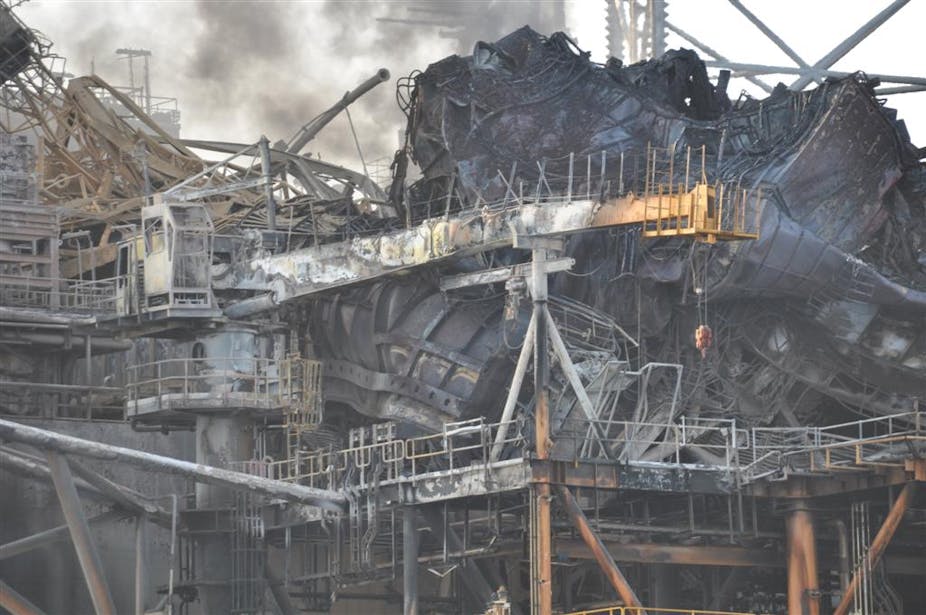In August 2009, a blowout at the Montara wellhead platform became Australia’s third-largest oil spill. Three years later, a fine of $510,000 has been levied on the Thai-based oil company PTT Exploration and Production, responsible for the release of an estimated 4,750 tonnes of crude oil into open ocean water off WA.
This fine closes the legal process, and is likely to be one of the smallest in the history of major oil spills. It compares to a settlement of $US7.8 billion for the BP Deepwater Horizon blowout.
The Montara fine is capped by the rather small maximum fines dictated by Australian law, but also by major uncertainties about impacts. Until we are better prepared to assess the effects of oil spills, we cannot expect stricter penalties.
Laws are important, but the laws governing petroleum and natural gas exploration already impose penalties to deter future oil spills. In spite of this, at least a dozen large spills have occurred since Montara, including Deepwater Horizon, the Rena spill in New Zealand, and more recently the spill in pristine habitat on Christmas Island. Without data, the law is powerless. It is in the interests of Australian marine industries and our environmental heritage to develop and fund rapid investigation of oil disasters.
The Montara Commission of Inquiry (MCI) concluded, “It is unlikely that the full environmental consequences of the Blowout will ever be known”. Estimates of the oil release range from 400 to 1,500 barrels per day. Estimates of the surface coverage of the hydrocarbons range from 6,000 to 90,000 square kilometres. These and other uncertainties - a result of the delay in deploying the scientific assessment program - compromised the worth of the impact evaluations.

Information is lacking about the effects of oil spills on food webs, the consequences of dispersant use to break up surface slicks or deep sea plumes, and the impacts on commercial fisheries and key ecosystems. With many untested dispersants slated for future application in spills, there is an urgent need to accelerate research in this area.
Australia has a rich marine environmental heritage that supports many healthy fisheries. But it also sustains significant oil reserves and supports high shipping traffic. Increased demand for oil results in expanded oil exploration at increasing depths offshore and into [vulnerable environments such as the Arctic](https://theconversation.com/groundhog-day-the-ice-extent-in-the-arctic-ocean-reaches-a-new-minimum-9070](https://theconversation.com/groundhog-day-the-ice-extent-in-the-arctic-ocean-reaches-a-new-minimum-9070). The risk of large-scale oil spills in the future is high.
Preventive measures with a focus on environmental protection and conservation must be given top priority. The Montara verdict, while a disappointing outcome for many, can be a motivational tool to increase the importance of the environment in the eyes of industry and politicians.
So how do we create common ground with a focus towards conservation and protection of our marine heritage?

A new Commonwealth Agency, the National Offshore Petroleum Safety and Environmental Management Authority (NOPSEMA), has generated new regulations requiring oil companies to apply objective, science-based environmental monitoring plans tailored for each oil exploration site. This is certainly a step in the right direction.
The scientific community must also step up to fill the knowledge gap on the effects of oil spills. Following Deepwater Horizon, British Petroleum (BP) committed $US500M over 10 years to establish broad, independent research programs involving Gulf scientists and domestic and international partnerships. This will ensure the longevity of research in the Gulf of Mexico, and the creation of similar funding programs in Australia to kick start research collaborations and hold industry accountable for environmental spills.
The Montara inquiry recommended better-integrated operational and scientific environmental monitoring. Scientific monitoring must be adequate, peer reviewed, independent and timely. Adequate baseline data must be available for comparison, and data must be updated throughout the extended lifespan (decades) of the environmental effects of any oil spill.
Australia has the third-largest economic exclusive zone in the world. But Australia’s fleet of oceanographic vessels is comparable to that of Belgium. Only one coastal research vessel, the Solander, is based in Western Australia, which has 15,000km of coastline and a dense concentration of marine-based industry.
Spain, with 4,000km of coastline and a crippled economy, operates seven oceanic research vessels and five research vessels over 50m. The public portion of the fleet is fully funded by the government and managed by a commission that allocates ship time to research projects and designates the ships to address disasters when they happen. They can be at sea immediately following a disaster. There are no complicated financial negotiations, such as those that delayed scientific monitoring of the Montara spill by seven weeks.

Australia’s deficiency in oceanographic research vessels remain the elephant in the room. A partnership between research providers, industry, government and the Australian Navy could, as demonstrated in countries such as Spain, Portugal, Canada, the US, Belgium and France, help develop a modern oceanographic fleet prepared to respond to disasters in our territory.
This is particularly important in Western Australia, where the oil and gas fields are located up to 4,000km from the nearest research facility. In the Gulf of Mexico, industry has jointly funded and maintained a research vessel, available to research providers for monitoring and prepared to address future spills.
Citizen-based monitoring and science projects could create increased awareness of the ocean environment and its resources. Operators in marine-based industries and their governmental regulators will benefit from advanced education in key notions of oceanography, marine ecology and environmental science. Scientists also need to take more of an active leadership role in educational outreach activities.
All involved those involved - government, industry, science and society - must change our mindset and attitude towards the way we operate in the ocean. We must be willing to meet on common ground. We can do better, and we should look forward to the challenge.
By all means, let’s clean up the milk. But let’s also stabilise the glass to avoid spilling it again.
The original version of this article stated that Montara spilled 30,000 tonnes of oil; that has been corrected to 4,750 tonnes.

